25 graphics showing upward redistribution of income and wealth in USA since 1979
from David Ruccio
I assemble a presentation on inequality on a regular basis for my Principles of Microeconomics course. Here are links to the latest one, from Fall 2010, as a pdf document, a Powerpoint presentation, and a Quicktime movie.
The following are some other representations of inequality (please feel free to send me additional ones):
source [ht: Magpie]
Leave a comment Cancel reply
This site uses Akismet to reduce spam. Learn how your comment data is processed.
Real-World Economics Review
WEA Books

follow this blog on Twitter
Top Posts- last 48 hours
- Weekend read - A STIGLITZ ERROR?
- Economics — a dismal and harmful science
- The non-existence of economic laws
- Cutting-edge macroeconomics …
- USA: The Great Prosperity / The Great Regression : 5 charts
- The Keynes-Tinbergen debate on econometrics
- I heard there’s some good shit on TV tonight …
- Real-world economists take note!
- Keynes and the casino
- The 15 largest arms exporters per capita
"We cannot solve our problems with the same thinking we used when we created them." Albert Einstein
Regular Contributors
Real World Economics Review
The RWER is a free open-access journal, but with access to the current issue restricted to its 25,952 subscribers (07/12/16). Subscriptions are free. Over one million full-text copies of RWER papers are downloaded per year.
WEA online conference: Trade Wars after Coronavirus
Comments on recent RWER issues
————– WEA Paperbacks ————– ———– available at low prices ———– ————- on most Amazons ————-
WEA Periodicals
----- World Economics Association ----- founded 2011 – today 13,800 members
Recent Comments
- David Harold Chester on Weekend read – A STIGLITZ ERROR?
- pfeffertag on Weekend read – A STIGLITZ ERROR?
- CBASILOVECCHIO on Weekend read – A STIGLITZ ERROR?
- Arbo on Economics — a dismal and harmful science
- spamletblog on Economics — a dismal and harmful science
- bckcdb on Economics — a dismal and harmful science
- David Harold Chester on Real-world economists take note!
- Patrick Newman on Real-world economists take note!
- deshoebox on Real-world economists take note!
- felipefrs on The non-existence of economic laws
- Seeker on The non-existence of economic laws
- Hepion on Water Flowing Upwards: Net financial flows from developing countries
- yoshinorishiozawa on Cutting-edge macroeconomics …
- Jan Wiklund on The non-existence of economic laws
- yoshinorishiozawa on Cutting-edge macroeconomics …
Comments on issue 74 - repaired
Comments on RWER issues
WEA Online Conferences
—- More WEA Paperbacks —-
———— Armando Ochangco ———-

Shimshon Bichler / Jonathan Nitzan

————— Herman Daly —————-

————— Asad Zaman —————

—————– C. T. Kurien —————

————— Robert Locke —————-

Guidelines for Comments
• This blog is renowned for its high level of comment discussion. These guidelines exist to further that reputation.
• Engage with the arguments of the post and of your fellow discussants.
• Try not to flood discussion threads with only your comments.
• Do not post slight variations of the same comment under multiple posts.
• Show your fellow discussants the same courtesy you would if you were sitting around a table with them.
Most downloaded RWER papers
- Green capitalism: the god that failed (Richard Smith)
- Why some countries are poor and some rich: a non-Eurocentric view (Deniz Kellecioglu)
- New thinking on poverty (Paul Shaffer)
- Debunking the theory of the firm—a chronology (Steve Keen and Russell Standish)
- Trade and inequality: The role of economists (Dean Baker)
- Global finance in crisis (Jacques Sapir)
- What Is Neoclassical Economics? (Christian Arnsperger and Yanis Varoufakis)
- The state of China’s economy 2009 (James Angresano)
- The housing bubble and the financial crisis (Dean Baker)
Family Links
Contact
follow this blog on Twitter
RWER Board of Editors
Nicola Acocella (Italy, University of Rome) Robert Costanza (USA, Portland State University) Wolfgang Drechsler ( Estonia, Tallinn University of Technology) Kevin Gallagher (USA, Boston University) Jo Marie Griesgraber (USA, New Rules for Global Finance Coalition) Bernard Guerrien (France, Université Paris 1 Panthéon-Sorbonne) Michael Hudson (USA, University of Missouri at Kansas City) Frederic S. Lee (USA, University of Missouri at Kansas City) Anne Mayhew (USA, University of Tennessee) Gustavo Marqués (Argentina, Universidad de Buenos Aires) Julie A. Nelson (USA, University of Massachusetts, Boston) Paul Ormerod (UK, Volterra Consulting) Richard Parker (USA, Harvard University) Ann Pettifor (UK, Policy Research in Macroeconomics) Alicia Puyana (Mexico, Latin American School of Social Sciences) Jacques Sapir (France, École des hautes études en sciences socials) Peter Söderbaum (Sweden, School of Sustainable Development of Society and Technology) Peter Radford (USA, The Radford Free Press) David Ruccio (USA, Notre Dame University) Immanuel Wallerstein (USA, Yale University)


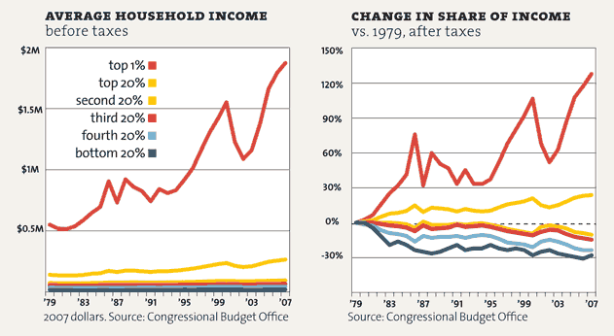
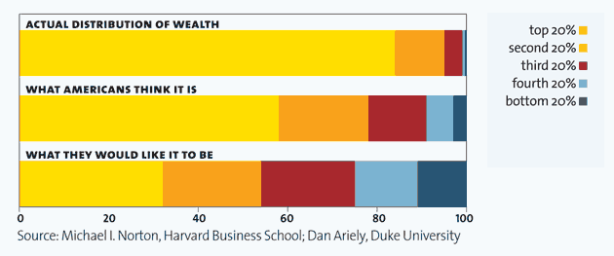



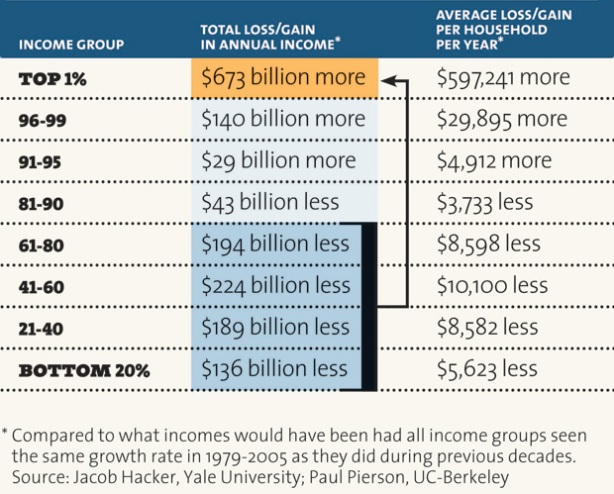







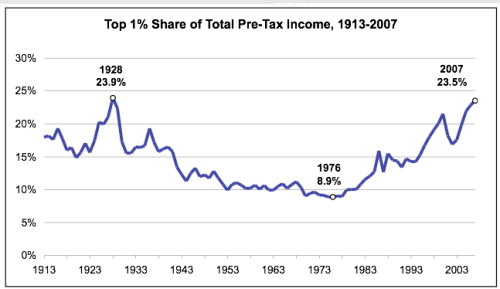

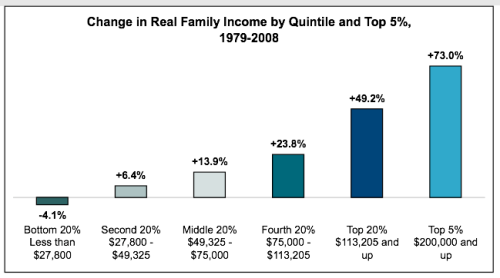





























I encountered this one: consumption inequality largely mirrors income inequality in the USA
http://www.nber.org/papers/w16807.pdf?new_window=1
I just finished listening/watching the American Petroleum Institute chief economist spiel the party line on C-SPAN…
So the most interesting graphic I find above is the Norton/Ariely bar graphs on actual, perceived, and desired distributions of wealth. There’s a wealth (no pun intended) of information beneath that about false consciousness, cognitive dissonance, and aspirations to meritocracy. It’s evidence that people do understand the point Engles had to repeat: Class struggle is not about eliminating the differences between people, it is about eliminating the differences between classes.
Good stuff all the above.
A somehow related graph on the reason why there’s inequality:
Now THAT is interesting. Suppose a gifted number-cruncher could do the regression analysis showing the decline of organized labor IS the most reliable predictor of widening distribution of wealth in the US. Would American workers believe it? One of the more unsettling things I heard yesterday on C-SPAN (I usually start my day there) were call-ins from people claiming to be PRIVATE sector union members opposed to PUBLIC sector unions – they were on Walker’s side. Could have been Republican shills telling lies (always a real possibility), or truly people who don’t know how much of the kool-aid they’ve already drank?
The number of strikes declined amazingly after 1981. What happened? According to A. Greenspan:
“In 2003, Federal Reserve Chairman Alan Greenspan, speaking on the legacy of Ronald Reagan,[10] noted:
Perhaps the most important, and then highly controversial, domestic initiative was the firing of the air traffic controllers in August 1981. The President invoked the law that striking government employees forfeit their jobs, an action that unsettled those who cynically believed no President would ever uphold that law. President Reagan prevailed, as you know, but far more importantly his action gave weight to the legal right of private employers, previously not fully exercised, to use their own discretion to both hire and discharge workers”
http://en.wikipedia.org/wiki/Air_traffic_controllers%27_strike_of_1981#August_1981_strike
Maybe you are right. I’m always skeptical if I hear a “Reagan” argument. For me Reagan was one of the greatest opportunist I’m aware off. Basically with Reagan you can argue for any policy you like or dislike. Easy to turn your argument on it’s head. Nope Merijn. Ronald Reagan was a staunch supporter of unions and collective bargaining:
My Saint Patron Ronny was a big fan of Solidarnosc ;-) I think there are several reasons for the decline of unions. One among them: mainstream microeconomics. The narrative of textbooks is straight forward: First students learn that monopolies are evil. Then atomistic employers are introduced in an epic competition with other atoms for employees in the labour market. But the supply side of this unique resource labour might put in place an evil monopoly: labour unions. This is not good!
Very interesting on economic inequality among classes in the US: the income share of the capitalist class has doubled since the 1980’s (Marx’s “degree of exploitation” has doubled). Source: Wolff, E.N. y Zacharias, A. (2007) “Class Structure and Economic Inequality,” Levy Economics Institute Working Paper No. 487.
I should have written: ” Marx’s ‘degree of exploitation’ has more than doubled.” The numerator has doubled, and the denominator simultaneously increased.
Sorry: the denominator simultaneously decreased.
David Ruccio, what superb work. Thank you.
@Stephan,
as far as I can say from this side of the Atlantic, I fully agree with you on Reagan and micro economics – and at the time it surely was not a ‘masterplan’ or something like that. But the Greenspan quote is remarkable, to me, as it illustrates how one of the most powerfull economists ever thought about labor on one side and management on the other side. It’s worthwhile to quote more of the Greenspan speech, with present unemployment and the ruccio graphhs in mind … (the style of the speech is quite hagiographic, but that only underscores Greenspans intentions) (thanks to ‘Anne’ on economist’s View):
“April 9, 2003
The Reagan Legacy
My predecessor at the Federal Reserve, Paul Volcker, embarked in the fall of 1979 on an aggressive monetary tightening that attempted to arrest a dangerously accumulating set of inflationary forces. Presidential candidate Reagan also perceived inflation as a danger, and, then as President, afforded Volcker the political support that is so essential to a central bank when its pursuit of long-term stability risks some worsening in near-term economic activity. That support began the process that has led today to the virtual elimination of inflation from the U.S. economy.
A second key support to today’s flexible markets has been the bipartisan deregulation initiatives that began in the Ford and Carter years and were extended by Ronald Reagan. In January 1981, disregarding warnings that the action might renew upward pressures on inflation, President Reagan dismantled the remaining controls that had debilitated our oil markets. By 1986, crude oil prices had reached their lowest levels in real terms since 1973. Deregulation in finance, trade, and transportation was pressed forward.
But perhaps the most important, and then highly controversial, domestic initiative was the firing of the air traffic controllers in August 1981. The President invoked the law that striking government employees forfeit their jobs, an action that unsettled those who cynically believed no President would ever uphold that law. President Reagan prevailed, as you know, but far more importantly his action gave weight to the legal right of private employers, previously not fully exercised, to use their own discretion to both hire and discharge workers. There was great consternation among those who feared that an increased ability to lay off workers would raise the level of unemployment and amplify the sense of job insecurity.
It turned out that with greater freedom to fire, the risks of hiring declined. This increased flexibility contributed to the ability of the economy to operate with both low unemployment and low inflation. Whether the average level of job insecurity has risen is difficult to judge, but, if so, some offset to that concern should come from a diminished long-term average unemployment rate.
The notion that lowering barriers to discharging workers reduces the long-term unemployment rate has gained widespread acceptance even beyond our shores. The European Council, meeting in Brussels last month, urged member states to “maintain the momentum of reform of national labor markets” by among other things, “relaxing overly restrictive elements that affect labor market dynamics.” That is not the way that Ronald Reagan would have put it, but analytically it is moving in a Reagan direction…. I am pleased to see a re-emergence of market value placed on trust and personal reputation governing business practice. Moreover, after the revelations of corporate malfeasance, the market punished the stock prices of those corporations whose past behaviors cast doubt on the reliability of their reputations. I hope and anticipate that trust and integrity again will be amply rewarded in the marketplace as they were in earlier generations”
How wrong can you be!
Reagan started the deregulation prosseses that were seized by those politians that followed and were undeniabley the cause of our DEPRESSION. Citizens United vs Federal gave corporate America the tool needed for control of voting ads via SuperPacs i.e.money.
This plus ALEC’s secret meetings between invited corporate CEOs and different state legislators to draft bills in their state legislatures that benefit them, attack public employees and labor unions and denying legitimate citizens of color, the poor and seniors their right to vote because they have no picture ID from the government is very close to subversion of a democratic form of legislation.
I suggest you go to Center for Media and Democracy on the internet and look at some 860 draft bills smuggled out of one of ALEC’s meetings. As a side note the Koch brothers back ALEC.
“That support began the process that has led today to the virtual elimination of inflation from the U.S. economy.” Sorry merijn, If you measure the inflation rate today the way it was measured in 1980, you get about 10%.
Reblogged this on Not The Grub Street Journal and commented:
https://notthegrubstreetjournal.com/2022/04/12/paul-krugman-china-mrna-vaccines-and-right-wing-populism-activism-and-the-academy-putin-once-a-zhil-laner-always-a-zhil-laner/